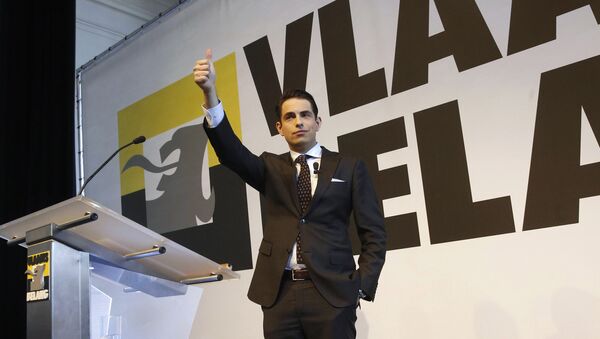The Flemish nationalist party (Vlaams Belang), which is currently led by 31-year-old Tom van Grieken, is becoming more active on social media platforms. According to Flemish Interest representative in the European Parliament and the party's former chairman Gerolf Annemans, this new communication strategy is already paying off.
Sputnik: Your party has had its ups and downs in recent years, followed by some strategy changes. What are the key elements of your political platform?
Gerolf Annemans: We had a defeat in the last election in 2014, so we switched to a new generation, which is now led by our party president Mr. van Grieken. So, the young and new generation is designing a new Vlaams Belang. As far as I can say, — because I don't want to intervene, or as a member of the older generation I don't want to give the impression that I'm at the steering wheel, — but as far as I can see, I think that my party is in this sense "the old one." We have these program points, like independent Flanders, solving the "Belgian problem," immigration, controlling the borders in a modern way, showing with political authority that there is the only way — assimilation, etcetera, reducing the number of asylums, and changing the European policy, because we are the only party in Flanders, which fundamentally criticizes the existence of the European Union in its actual form. And it is a very necessary thing because the power, and the center of power is [becoming] more and more European — things like multilateralism, multiculturalism, globalism, the whole left-wing file on migration, open borders, and European defense policy, etcetera.
"Europeanizing" everything — that was not the deal when we made the European Union, and we are the only Flemish party, which is criticizing, and me as the only member of [European] Parliament from Vlaams Belang, — I'm more or less presenting that part of our strategy.
You see there the photograph of Václav Havel, which is the only political authority that I have ever put on my desk, because he's a very aspiring man. He made his own independent republic, like we wanted to do, he criticized the European Union and refused [to put] his signature to the Treaty of Lisbon for as long as possible, and now we are editing a book that he wrote about mass immigration and the dangers that come out of it. So, if you would like to look at an international reference for what we are, what kind of party we are, I can name Václav Havel as well I can Marine Le Pen, and all the parties that are members of the Europe of Nations and Freedom group in the European Parliament.
Sputnik: The face of political power is changing. Flemish Interest's chairman Tom van Grieken communicates actively with voters on Facebook. Is it a sign that you're trying to work with a new audience, and do you feel the support of that audience on social media?
Gerolf Annemans: Yes, more and more. We also see the effect of what we are doing in the way our adversaries are trying to answer to him. In the first year of van Grieken's arrival we doubled the party to 12%, so there was great, huge panic with other parties like N-VA (New Flemish Alliance), who turned the right way — not in the sense of "the good way", but in the sense of "right-wing way" — to "cover" with this growth of Vlaams Belang. And that's always been our meaning, the meeting of our party is that we influence fundamentally the behavior of all the parties in Flanders more or less: left-wing by having a "right-wing devil" in town, or in the house, and the right-wing parties change their program towards ours. As long as there is Vlaams Belang — then there will be pressure to move in the right direction. So we are an influential party, coming out of our past, where we once were the biggest party in Belgium, and still now coming out of our growth. Yes, we feel the growth.
Sputnik: Are there any exact growth numbers, percentages?
Gerolf Annemans: We see now a little slide, back down after the first year [of Tom Grieken's chairmanship], we saw the way to go, so our objective is to double the party in 2019, meaning 12-12.5 percent in the next year and a half. That should be necessary and that should be useful to have good and strong Vlaams Belang, stable and strong Vlaams Belang. Because of the influence that we have, we hope that the Flemish people will use us, again, as they did in the past, for a strong policy on the themes that we are putting on the table.
Sputnik: How much of the [party's] success comes from your stance on migration and cross-cultural issues?
Gerolf Annemans: I would not play the sociologists' game where for some reason people from little polls of 500 try to extrapolate what is the electorate of Vlaams Belang. We know, of course, our growth in 2015 had to do with mass immigration. It was visible on television screens every day. But we also know that it was also because of the new way that Vlaams Belang was organized and communicated in a modern way — a more modern way than before. And so, we also know that N-VA (New Flemish Alliance) tried to pick off that growth again, by Francken and those who actually established the N-VA's right-wing policy, that now serves "the old Vlaams Belang electorate." That means that people stay with N-VA, so we got them back, we are in a constant battle with them. So, as long as our members of government are also obliged in some sense to have a left-wing policy, or central-wing policy, they try to solve that by having a quorum with the Christian Democrats in their own coalition, so it will be an interesting fight in the next few years.




